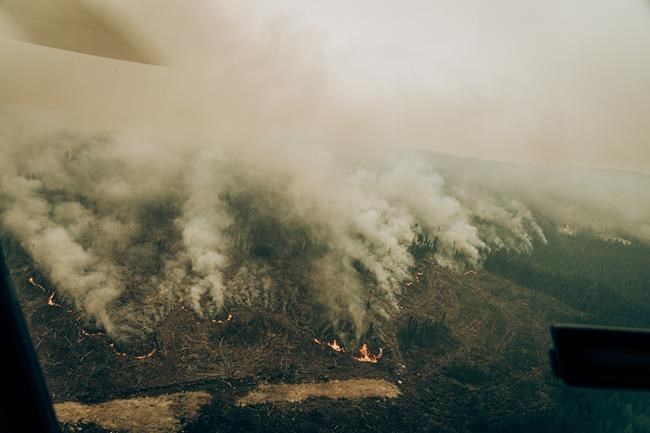Wildfires across Canada are forcing some forestry companies to pause operations, particularly in Quebec.Â
Close to five million hectares have been burned so far, and workers in some forestry communities have been evacuated, said Derek Nighbor, president and CEO of the Forest Products Association of Canada.Â
"The impact is significant," he said, adding, "it's really varying across the country."Â
Some mills and woodlands operations across the country are unable to operate right now for safety reasons, he said.
One of the companies forced to suspend operations is Montreal-headquartered Resolute Forest Products Inc.Â
"For Resolute, we are particularly impacted by the boreal forest devastation in Quebec, where 2023 is already shaping up the be the worst year in over three decades in terms of the extent of area affected," spokesman Seth Kursman said in an email.Â
"Although wildfire is a natural part of forest regeneration, the unseasonal heat and lack of rain has prompted many fires to erupt at the same time, making them very difficult to manage."
Kursman said the company last week suspended all woodlands operations across Quebec, and suspended operations at its Senneterre and Comtois sawmills in the Abitibi and Nord-du-Québec regions. The company also suspended operations at the Girardville and La Doré wood products facilities in Lac-Saint-Jean as well as the Outardes sawmill in the Côte-Nord region, but was able to restart the Outardes operations shortly after suspending them thanks to cooler temperatures and rain.Â
Quebec has so far seen the biggest impact in recent weeks when it comes to forestry companies' operations being affected by wildfires, said Nighbor. The association is also particularly concerned about the fire outside Edson, Alta., he said.Â
Lumber prices are also rising as the fires continue, with lumber futures for July up 6.8 per cent Tuesday evening compared with a week earlier.Â
In a note last week, RBC Capital Markets analysts Paul Quinn and Matthew McKellar said forest fires can contribute to higher lumber prices, likely due to either constrained supply or the fear of constrained supply leading to buyers increasing inventories. The analysts noted at the time that lumber futures had ticked higher, attributing that to the current fires, and also noted that significant fires can affect longer-term timber supply.Â
Nighbor said that even once the fires are under control, it won't be business as usual for companies that have paused operations, as they have to assess the impact of the fires on supply.Â
"The next question is, what forests have been impacted? And how bad have they been impacted?" he said. "We'll then be able to assess the impact on timber supply, and what needs to be done to either salvage or get some of the dying or dead or decayed stuff out of the bush so it doesn't become kindling for the next fire season."
Resolute's infrastructure appears to be intact so far, said Kursman, but the company expects that some of its woodlands contractor partners will have lost critical equipment.Â
The company is in the process of planning the harvest of burned trees as soon as the province gives Resolute the green light to resume woodlands operations, said Kursman.Â
"This must be done as quickly as possible before insects infest and further degrade the trees," he said.Â
This report by The Canadian Press was first published June 13, 2023.
Rosa Saba, The Canadian Press



